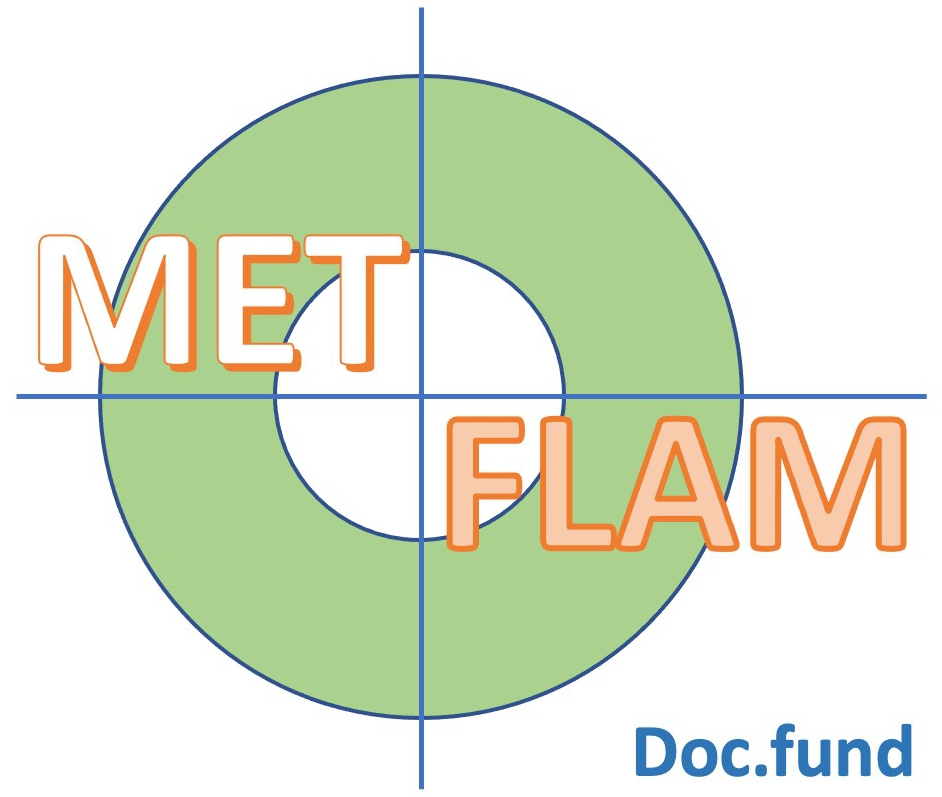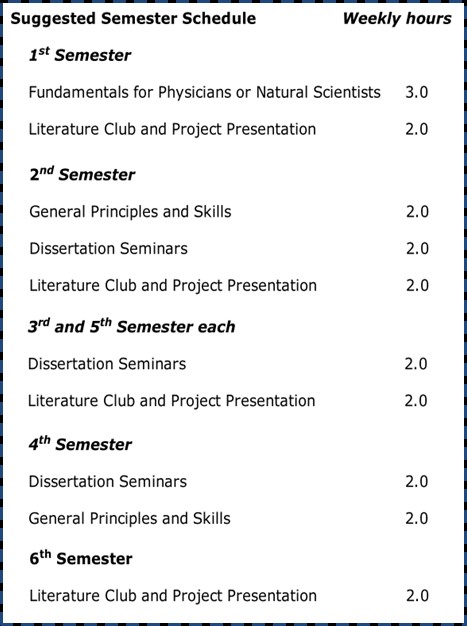


Training Program
 The minimum PhD study duration at the Med Uni Graz is 3 years, which is extended by a 4th year if students go abroad for a research
stay of more than 6 months (this option is chosen by the majority of students). In some cases, the time to graduation is prolonged by
additional professional interests such as clinical training or voluntary administrative / management duties, or by parental leave.
The minimum PhD study duration at the Med Uni Graz is 3 years, which is extended by a 4th year if students go abroad for a research
stay of more than 6 months (this option is chosen by the majority of students). In some cases, the time to graduation is prolonged by
additional professional interests such as clinical training or voluntary administrative / management duties, or by parental leave.
MET-FLAM is a clinically-oriented PhD program and studies conditions based on immunometabolic inflammatory mechanisms in a broad spectrum of diseases. Synergies of classical inflammatory topics such as pro- and anti-inflammatory lipids and cytokines with structural molecules and metabolism are exploited.
“The policy of the Med Uni Graz is to offer its students highest training standards and in-depth scientific expertise, including several high-impact authorships, thereby facilitating their career options.”
Content and workload of PhD training in the MET-FLAM program
The curriculum of PhD studies at the Med Uni Graz regulates the number of hours of formal teaching required. PhD programs must offer 375 hours of lectures, seminars, and practical courses within the study period. On average, formal teaching activities amount to 4 hours per week (see proposed semester schedule on the left).The formal teaching activities fulfill 3 fundamental goals:
- PhD candidates should rapidly acquire all the fundamental skills and background knowledge needed for scientific research. Additionally,
they should gain insights into biomedical science beyond the scope of their individual research projects,
i. e. a broad overview of different state-of-the-art approaches and novel concepts in the fields of inflammation, respiratory physiology and pathology. - Newly enrolled PhD candidates are likely to have different educational backgrounds. Thus, it is a major task of the training to compensate for such disparities and to provide our young researchers with a common scientific vocabulary. Graduates of medical schools may not be equally versed in molecular sciences and laboratory techniques, whereas graduates of life sciences benefit from an overview of medical terminology, physiology, pathology and pharmacology, and clinical processes. To this end, students attend either the Fundamentals of Molecular Biology or Introduction to Clinical Medicine workshop.
- The training activities are also designated to foster the contact and communication among students to facilitate the exchange of concepts and technical skills.
Research training and technical skill set offered to MET-FLAM students
Scientific research project: The core element of the training is the thesis project. The majority of time is spent in the laboratory performing hypothesis-driven cutting-edge research in close contact with their supervisors and MET-FLAM faculty members.Basics in molecular biology: MD students learn biochemical, molecular and cell biological concepts and commonly used laboratory methods. Theoretical knowledge includes the genomic organization, (sub)cellular structure and signal transduction. The practical part addresses basic molecular biological techniques and cutting-edge omics-approaches.
Introduction to clinical medicine: The course covers the pathobiology of the major inflammatory diseases being studied in the MET-FLAM research program. It gives insight into different clinical processes and problems, including current unmet medical needs, thereby illustrating the importance of basic inflammation research in clinical medicine.
Virtual lab visits: These seminars deliver profound insights into the research landscape, technologies, and infrastructure of the consortium, develop personal and professional networks, and initiate first collaborations. All MET-FLAM faculty members present their research topic and discuss their research data. Advanced PhD students and postdocs give a detailed overview of available methods.
Statistics, data management plan, and open data policy: Students will be introduced to the fundamentals of biostatistics, including a standardized data management plan on how to record, analyze, and store their data. This implements comprehensive quality control, facilitates the exchange of data sets, and secures long-term availability of results.
Research integrity, ethics and good scientific practice: A strict sense of research integrity must be attained from the very beginning, and students must adhere to national/international codes of ethics and good scientific/clinical practice.
Teaching experience: Students in their third year are given the opportunity to act as tutors for undergraduate and beginner students in methodological courses or as co-supervisors of master students.
Specific MET-FLAM courses
Bioinformatics: A course dealing with big data "system approaches" which will be held by Dr. Thallinger (Institute of Computational Biotechnology, Graz University of Technology), Dr. Jochen Wilhelm from the ECCPS, Giessen, Germany, and Dr. Alexander Avian (Med Uni Graz).Clinical trials and evidence-based medicine: To understand the scientific background of state-of-the-art clinical procedures and to learn where unmet clinical needs exist, students will gain insights into the most relevant clinical trials and how the findings have been translated into clinical routine. To provide students with a solid translational basis, additional structured courses will cover crucial aspects of translational medicine: a) biobanking and ethics (Christian Gülly, head of biobank, Kwapiszewska), b) clinical study design (Khalil, Olschewski and Stadlbauer-Köllner), c) metabolism and inflammation (Angiari, Kratky, Marsche, Olschewski), and d) immunopharmacology (Stradner, Heinemann, Wolf).
Scientific presentations and discussions: A convincing presentation of one’s research data and the ability to critically discuss the work of peers are crucial requirements in scientific life. MET-FLAM provides a workshop on scientific presentations skills, journal clubs, work-in-progress technical workshops, and the annual MET-FLAM retreat. The students will gain a solid understanding of the pathomechanisms and current treatment options for several inflammatory diseases through a series of lectures, courses, and discussion panels that will build on the current PhD curriculum at the Med Uni Graz. Once a year, a representative from one of the companies will be invited to participate in the discussion of potential treatment options and targets to deliver commercial input to the projects. Journal clubs will deal with newest molecular advances and current clinical trials in diagnosis, treatment, and biomarkers of metabolic inflammatory diseases. Each student must be prepared for this coursework as the discussion of the publications is interactive.
Academic spirit and scholarship: MET-FLAM provides special funding to encourage the participation of PhD students in international conferences / workshops and to invite renowned international guest speakers.
Career management: As not all PhD graduates will pursue an academic career, an individual career plan will be created after the second year. MET-FLAM will offer workshops on CV writing and interview techniques, as well as on applying for job and funding.
Personal and complementary skills: Networking, project management and organizational skills, communication skills / presentation techniques (written and verbal), and intercultural communication are offered by the Med Uni Graz Career Center.